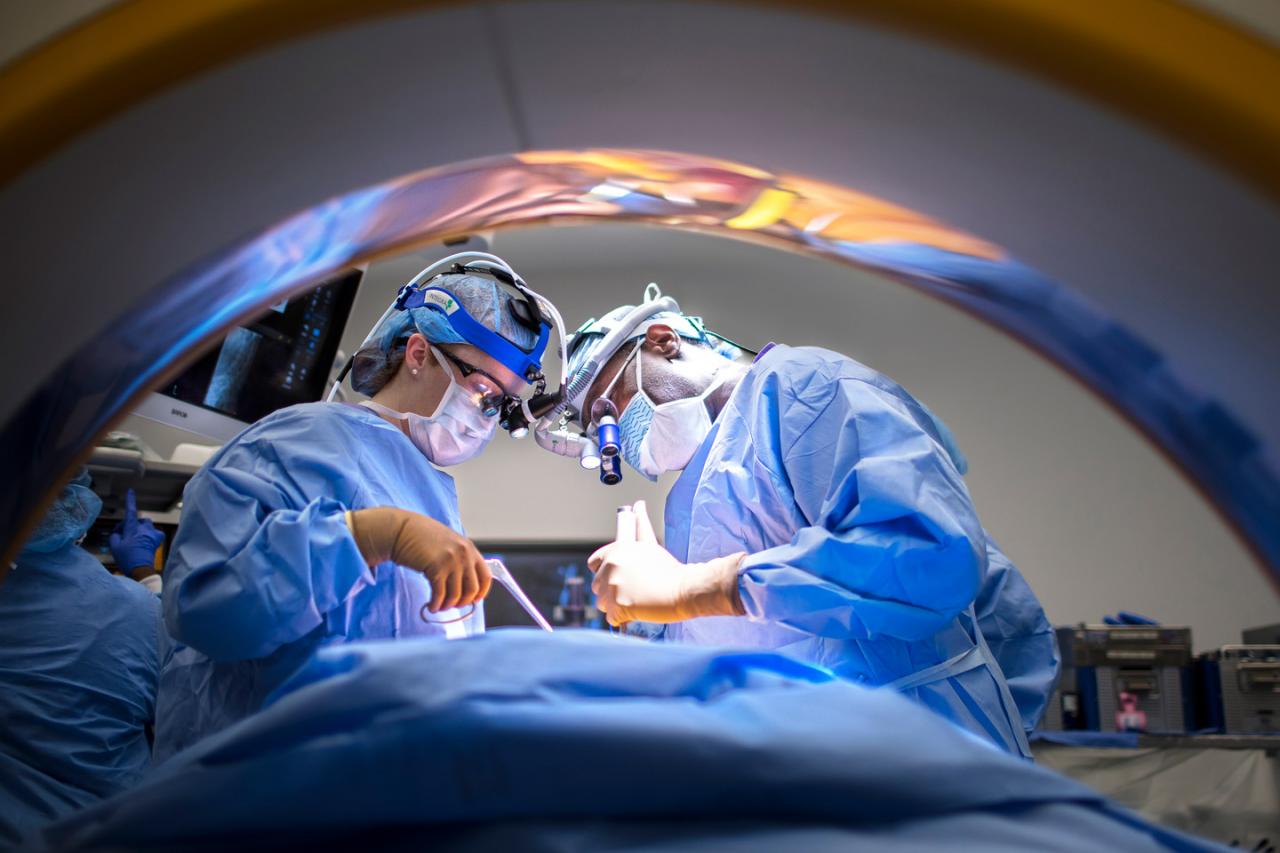
Neurosurgeon
Neurosurgeons are medical professionals who specialize in diagnosing and treating disorders of the nervous system. This includes the brain, spinal cord, or peripheral nerves.
Neurosurgeons are medical doctors that diagnose and treat conditions related to the brain, spine, or other parts of your nervous system. They differ from neurologists in that they’re specifically trained or certified in the use of surgical treatments, whereas neurologists focus on other forms of treatment.
Key Areas of Neurosurgery:
- Brain Surgery: Includes removing tumors, treating aneurysms, and addressing conditions like epilepsy or traumatic brain injuries.
- Spinal Surgery: Treats problems such as herniated discs, spinal tumors, scoliosis, and degenerative spine conditions.
- Peripheral Nerve Surgery: Focuses on nerve injuries outside the brain and spinal cord, such as carpal tunnel syndrome.
- Pediatric Neurosurgery: Deals with congenital conditions affecting children, like spina bifida or pediatric brain tumors.
- Functional Neurosurgery: Addresses disorders like Parkinson’s disease or epilepsy through techniques like deep brain stimulation.
Common Conditions Treated by Neurosurgeons:
- Brain Tumors: Both malignant and benign tumors in the brain.
- Traumatic Brain Injuries: Damage caused by accidents or severe trauma.
- Spinal Cord Injuries: Conditions that may lead to paralysis or loss of motor functions.
- Hydrocephalus: The condition where excess fluid builds up in the brain.
- Cerebral Aneurysms: Weak areas in blood vessels that can rupture, leading to brain hemorrhage.
- Degenerative Spine Diseases: Conditions like herniated discs, spinal stenosis, and sciatica.
Neurosurgical Techniques:
- Minimally Invasive Surgery: Reduces recovery time and risk by using small incisions and advanced imaging techniques.
- Endoscopic Surgery: Uses a thin tube with a camera to perform surgery inside the brain or spine with minimal damage to surrounding tissues.
- Stereotactic Surgery: Uses imaging technology to precisely target areas in the brain, commonly used for tumor removal or treating conditions like epilepsy.
- Microsurgery: Utilizes powerful microscopes for highly delicate and precise procedures on small structures like blood vessels or nerves.
Education and Training:
A neurosurgeon undergoes extensive education, including:
- Medical School: 4 years of basic medical education.
- Residency: 6-8 years of specialized neurosurgery training.
- Fellowship (optional): Additional 1-2 years of subspecialty training in areas like pediatric neurosurgery, spine surgery, or vascular neurosurgery.
Role of a Neurosurgeon
Neurosurgeons deal with:
- Brain disorders: Tumors, traumatic injuries, hemorrhages, and infections.
- Spinal disorders: Disc herniation, spinal tumors, fractures, scoliosis, and degenerative diseases.
- Peripheral nerve problems: Nerve compression, injuries, and conditions like carpal tunnel syndrome.
- Vascular conditions: Aneurysms, arteriovenous malformations (AVMs), and strokes.
- Functional disorders: Conditions like Parkinson’s disease, epilepsy, and trigeminal neuralgia are often managed through neurosurgical interventions, such as deep brain stimulation (DBS).
Conditions Treated by Neurosurgeons
Some common conditions neurosurgeons treat include:
- Brain Tumors: Whether malignant or benign, neurosurgeons manage both primary and secondary (metastatic) brain tumors.
- Stroke and Aneurysms: Neurosurgeons are involved in treating hemorrhagic strokes, clipping aneurysms, or using minimally invasive procedures to prevent rupture.
- Spinal Cord Injuries: They manage acute injuries, perform spinal stabilization, and may address chronic pain or deformities.
- Herniated Discs: When conservative treatments fail, neurosurgeons may perform surgeries like discectomies to relieve pressure on spinal nerves.
- Hydrocephalus: This involves draining excess cerebrospinal fluid (CSF) from the brain to prevent damage.
- Epilepsy: Some patients with drug-resistant epilepsy benefit from surgical procedures to remove or disconnect seizure-causing areas of the brain.
Types of Neurosurgery
- Craniotomy: The removal of part of the skull to access the brain for surgeries like tumor removal or treating aneurysms.
- Spinal Surgery: Includes laminectomy, spinal fusion, and disc replacement, aimed at treating conditions like stenosis or herniated discs.
- Endoscopic Surgery: Minimally invasive surgery to access the brain or spine using small incisions and specialized instruments.
- Deep Brain Stimulation (DBS): A procedure where electrodes are implanted in the brain to regulate abnormal activity, often used in Parkinson’s disease.
Training of a Neurosurgeon
Becoming the neurosurgeon requires extensive education or training:
- Undergraduate degree (usually in a scientific field).
- Medical school: Four years of medical education to become a doctor (MD or equivalent).
- Residency: Neurosurgery residency lasts between 6 to 8 years. It involves hands-on experience with patients, performing surgeries under supervision, and learning advanced surgical techniques.
- Fellowship (optional): Some neurosurgeons pursue further specialized training in a subfield, such as pediatric neurosurgery, spine surgery, or neuro-oncology.
Advancements in Neurosurgery
- Robotics and AI: These technologies assist neurosurgeons in performing highly precise and minimally invasive surgeries.
- Neuronavigation: A GPS-like system for the brain that helps surgeons navigate complex areas during operations.
- Intraoperative Imaging: Techniques like MRI or CT scans used during surgery to improve outcomes and accuracy.
- Stem Cell Therapy: Emerging treatment areas for neuroregenerative therapies, particularly for spinal injuries and neurodegenerative conditions.
At our Neurosys Multispeciality Center, we perform several key procedures including Craniotomy, which is primarily for the excision of brain tumors; V-P Shunt Surgery for treating hydrocephalus; surgeries for epilepsy; and operations targeting brain stem glioma. Beyond these, we offer a range of other neurosurgical services. If you have any questions that are not answere, please contact us through our Contact Us or Book your Appointment.
